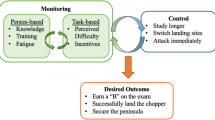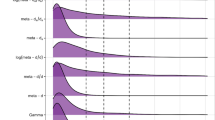Abstract
Low accuracy levels are often obtained when readers are asked to predict test performance over reading materials. Three investigations further explore the information readers use to make predictions during metacomprehension. Our results show that readers’ estimates are influenced by factors such as their initial impression of the reading task, based in part on their perceptions surrounding text genre and test item type. To explain these and other published results, a new framework for investigating metacomprehension using Tversky and Kahneman’s (Science, 185:1124–1131, 1974) anchoring and adjustment heuristic as a guide is proposed. We argue that readers anchor comprehension test performance on factors such as self-perceptions of reading ability and/or perceptions of the reading task and then insufficiently adjust their predictions to reflect the demands of the specific reading task at hand such as text difficulty.
Similar content being viewed by others
References
Daneman, M., & Carpenter, P. A. (1980). Individual differences in working memory and reading. Journal of Verbal Learning and Verbal Behavior, 19, 450–466. doi:10.1016/S0022-5371(80)90312–6.
Dunlosky, J., Baker, J. M. C., Rawson, K. A., & Hertzog, C. (2006). Does aging influence people’s metacomprehension? Effects of processing ease on judgments of text learning. Psychology and Aging, 21, 390–400. doi:10.1037/0882-7974.21.2.390.
Dunlosky, J., Rawson, K. A., & Middleton, E. L. (2005). What constrains the accuracy of metacomprehension judgments? Testing the transfer-appropriate-monitoring and accessibility hypotheses. Journal of Memory and Language, 52, 551–565. doi:10.1016/j.jml.2005.01.011.
Dunning, D., Johnson, K., Ehrlinger, J., & Kruger, J. (2003). Why people fail to recognize their own incompetence. Current Directions in Psychological Science, 12, 83–87. doi:10.1111/1467-8721.01235.
Epley, N., & Gilovich, T. (2001). Putting adjustment back in the anchoring and adjustment heuristic: Differential processing of self-generated and experimenter-provided anchors. Psychological Science, 12, 391–396. doi:10.1111/1467-9280.00372.
Epley, N., & Gilovich, T. (2004). Are adjustments insufficient? Personality and Social Psychology Bulletin, 30, 447–460. doi:10.1177/0146167203261889.
Epley, N., & Gilovich, T. (2005). When effortful thinking influences judgmental anchoring: Differential effects of forewarning and incentives on self-generated and externally provided anchors. Journal of Behavioral Decision Making, 18, 199–212. doi:10.1002/bdm.495.
Epley, N., & Gilovich, T. (2006). The anchoring-and-adjustment heuristic: Why the adjustments are insufficient. Psychological Science, 17, 311–318. doi:10.1111/j.1467-9280.2006.01704.x.
Ericsson, K. A., & Simon, H. A. (1993). Protocol analysis: Verbal reports as data (rev. ed.). Cambridge, MA: MIT Press.
Flavell, J. H. (1979). Metacognition and cognitive monitoring: A new era of cognitive developmental inquiry. The American Psychologist, 34, 906–911. doi:10.1037/0003-066X.34.10.906.
Flavell, J. H., Miller, P. H., & Miller, S. A. (1993). Cognitive Development (3rd ed.). Englewood Cliffs, NJ: Prentice Hall.
Glenberg, A. M., & Epstein, W. (1987). Inexpert calibration of comprehension. Memory & Cognition, 15, 84–93.
Glenberg, A. M., Sanocki, T., Epstein, W., & Morris, C. (1987). Enhancing calibration of comprehension. Journal of Experimental Psychology. General, 116, 119–136. doi:10.1037/0096-3445.116.2.119.
Just, M. A., & Carpenter, P. A. (1992). A capacity hypothesis of comprehension: Individual differences in working memory. Psychological Review, 99, 122–149. doi:10.1037/0033-295X.99.1.122.
Kaakinen, J. K., Hyona, J., & Keenan, J. M. (2003). How prior knowledge, WMC, and relevance of information affect eye fixations in expository text. Journal of Experimental Psychology. Learning, Memory, and Cognition, 29, 447–457. doi:10.1037/0278-7393.29.3.447.
Kintsch, W. (1998). Comprehension: A paradigm for cognition. New York: Cambridge University Press.
Kornell, N., & Bjork, R. A. (2007). The promise and perils of self-regulated learning. Psychonomic Bulletin & Review, 14, 219–224.
Linderholm, T. (2002). Predictive inference generation as a function of working memory capacity and casual text constraints. Discourse Processes, 34(3), 259–280.
Linderholm, T., & Zhao, Q. (2008). The impact of strategy instruction and timing of estimates on low and high working-memory capacity readers’ absolute monitoring accuracy. Learning and Individual Differences, 18(2), 135–143. doi:10.1016/j.lindif.2005.09.002.
Linderholm, T., Cong, X., & Zhao, Q. (2008). Differences in Low and High Working-Memory Capacity Readers’ Cognitive and Metacognitive Processing Patterns as a Function of Reading for Different Purposes. Reading Psychology, 29, 61–85. doi:10.1080/02702710701568587.
Maki, R. H. (1998). Test prediction over text materials. In D. J. Hacker, J. Dunlosky, & A. C. Graesser (Eds.), Metacognition in educational theory and practice (pp. 117–144). Hillsdale, NJ: Erlbaum.
Maki, R. H., & Serra, M. (1992). The basis of test predictions for text material. Journal of Experimental Psychology. Learning, Memory, and Cognition, 18, 116–126. doi:10.1037/0278-7393.18.1.116.
Maki, R. H., Shields, M., Wheeler, A. E., & Zacchilli, T. L. (2005). Individual differences in absolute and relative metacomprehension accuracy. Journal of Educational Psychology, 97, 723–731. doi:10.1037/0022-0663.97.4.723.
Maki, W. S., & Maki, R. H. (2002). Multimedia comprehension skill predicts differential outcomes of web-based lecture courses. Journal of Experimental Psychology. Applied, 8, 85–98. doi:10.1037/1076-898X.8.2.85.
Metcalfe, J., Schwartz, B. L., & Joaquim, S. G. (1993). The cue-familiarity heuristic in metacognition. Journal of Experimental Psychology. Learning, Memory, and Cognition, 19, 851–864. doi:10.1037/0278-7393.19.4.851.
Moore, D., Lin-Agler, L., & Zabrucky, K. M. (2005). A source of metacomprehension inaccuracy. Reading Psychology, 26, 251–265. doi:10.1080/02702710590962578.
Morris, C. C. (1990). Retrieval processes underlying confidence in comprehension judgments. Journal of Experimental Psychology. Learning, Memory, and Cognition, 16, 223–232. doi:10.1037/0278-7393.16.2.223.
Rawson, K. A., & Dunlosky, J. (2002). Are performance predictions for text based on ease of processing? Journal of Experimental Psychology. Learning, Memory, and Cognition, 28, 69–80. doi:10.1037/0278-7393.28.1.69.
Scheck, P., Meeter, M., & Nelson, T. O. (2004). Anchoring effects in the absolute accuracy of immediate versus delayed judgments of learning. Journal of Memory and Language, 51, 71–79. doi:10.1016/j.jml.2004.03.004.
Scheck, P., & Nelson, T. O. (2005). Lack of pervasiveness of the underconfidence-with-practice effect: Boundary conditions and an explanation via anchoring. Journal of Experimental Psychology, 134, 124–128.
Scouller, K. (1998). The influence of assessment method on students’ learning approaches: Multiple choice question examination versus assignment essay. Higher Education, 35, 453–472. doi:10.1023/A:1003196224280.
Thiede, K. W., & Anderson, M. C. M. (2003). Summarizing can improve metacomprehension accuracy. Contemporary Educational Psychology, 28, 129–160. doi:10.1016/S0361-476X(02)00011-5.
Thiede, K. W., Anderson, M. C. M., & Therriault, D. (2003). Accuracy of metacognitive monitoring affects learning of texts. Journal of Educational Psychology, 95, 65–73. doi:10.1037/0022–0663.95.1.66.
Tversky, A., & Kahneman, D. (1974). Judgment under uncertainty: Heuristics and biases. Science, 185, 1124–1131. doi:10.1126/science.185.4157.1124.
van den Broek, P. W., Young, M., Tzeng, Y., & Linderholm, T. (1999). The landscape model of reading: Inferences and the on-line construction of a memory representation. In H. van Oostendorp, & S. R. Goldman (Eds.), The construction of mental representations during reading (pp. 71–98). Mahwah, NJ: Erlbaum.
Weaver III, C. A., & Bryant, D. S. (1995). Monitoring of comprehension: The role of text difficulty in metamemory for narrative and expository text. Memory & Cognition, 23, 12–22.
Wolfe, M. B. W. (2005). Memory for narrative and expository text: Independent influences semantic associations and text organization. Journal of Experimental Psychology. Learning, Memory, and Cognition, 31, 359–364. doi:10.1037/0278-7393.31.2.359.
Zhao, Q., & Linderholm, T. (2008). Adult metacomprehension: Judgment processes and accuracy constraints. Educational Psychology Review, 20, 191–206. Retrieved from http://www.springerlink.com/content/104855
Zhao, Q., Linderholm, T., & Therriault, D. (2006). Absolute metacomprehension accuracy: The effects of cue-utilization instruction and working-memory capacity. Poster session presented at the 2006 American Psychological Association Convention, New Orleans, LA, August
Zimmerman, B. J. (1989). A social cognitive view of self-regulated academic learning. Journal of Educational Psychology, 81, 329–339. doi:10.1037/0022-0663.81.3.329.
Author information
Authors and Affiliations
Corresponding author
Rights and permissions
About this article
Cite this article
Linderholm, T., Zhao, Q., Therriault, D.J. et al. Metacomprehension effects situated within an anchoring and adjustment framework. Metacognition Learning 3, 175–188 (2008). https://doi.org/10.1007/s11409-008-9025-1
Received:
Accepted:
Published:
Issue Date:
DOI: https://doi.org/10.1007/s11409-008-9025-1




